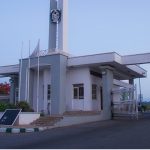
The 2025 Appropriation Bill Ogun State Governor, Prince Dapo Abiodun recently presented to the State House of Assembly represents a new paradigm shift from the traditional disproportionate imbalance between recurrent and capital expenditures. One significant highlight of the analysis of the N1.054trn budget proposal is the higher percentage voted for capital expenditure vis-a-vis recurrent expenditure. Comparison of the two varieties shows a sharp departure from the past. Appropriating 60 percent to capital expenditure as against 40 percent for recurrent is an important milestone in the administration’s effort towards achieving a sustainable economic growth.
In economics, capital expenditures are funds used to purchase, upgrade, and maintain physical assets, such as buildings, property, or equipment. Recurrent expenditures, on the other hand, are ongoing operating expenses, or short-term expenses, used for day-to-day running of the administration.
The ratio of recurrent to capital expenditure in economics can vary depending on the time period and the country. For instance, in Nigeria, since the advent of the present democratic dispensation, percentage of capital to recurrent expenditure has been on a declining trend. Between 2010 and 2019, recurrent expenditure made up 79.32 percentage of total expenditure, while capital expenditure made up 20.68 percent. Whereas, in the period 1981 and 1990, recurrent expenditure made up 56.66 percent of total expenditure, while capital expenditure made up 43.34 percent.
No economy can grow by mere conspicuous consumption. Investment in critical sectors like road infrastructures, human capital, healthcare service delivery, among others, is very essential for economic development. These will ultimately result in higher productivity and income level, resulting in mutually reinforcing saving and investment.
Under the present administration of Abiodun, road infrastructure transformation, accessible healthcare service delivery and human capital development have been the major priority of the government. This trajectory is going to continue in the new fiscal year.
As already enunciated in the proposed budget, the key priority areas for capital projects include revitalization of 80 primary healthcare centres, procurement of laboratory and medical equipment across all primary health facilities in the state, construction of fire stations, upgrading of rural roads, extension of the Redline Metro Rail, procurement and energizing of transformers, among others.
The sectoral breakdown of the appropriation bill Governor Abiodun tagged: “Budget of Hope and Prosperity,” shows that N453.56 billion will be recurrent expenditure while N600.98 billion will be for capital expenditures. According to him, N120.1 billion would go for personnel cost, N37.49 billion for consolidated revenue cost, public debt charges would gulp N76.07 billion, while N219.86 billion would be spent on overhead costs.
In specific terms, Abiodun promised that the government would embark on the construction of the Ogun Lodge Government House in Abuja, rehabilitate 150 km of feeder roads across the state, construct the OGIRS Revenue House, and a modern Court of Appeal in the state.
To ensure that financing of the budget align with the strategy to enhance revenue generation capacity, he explained that an estimated N120.97 billion would come from the State Internal Revenue Service, N193.85 billion from Ministries, Departments, and Agencies (MDAs), totaling N314.82 billion. He also projected statutory allocations from the Federal Government, including Value Added Tax, to be N228.06 billion, while capital receipts comprising internal and external loans as well as grants and aids are put at N472.66 billion.
For the human capital development, the governor said education would gulp N117.83 billion, representing 17 percent of the total budget. The importance of the high premium placed on the education sector in the budget cannot be over emphasized. Although the percentage voted for the sector is still a far cry from the 25 UNESCO recommendations, the figure represents a significant leap forward from the traditional low budget for education under the successive administrations.
Further sectoral details indicated that health would gulp N134.538 billion (13 percent), housing and community development N66.382 billion (6 percent), agriculture and industry N65.387 billion (6 percent), infrastructure N284.456 billion (27%), recreation, culture, and religion N25.27 billion (2 percent), social protection N39.836 billion (4 percent), general public service – executive organ N46.863 billion (4 percent), general public service – (financial & fiscal affairs) N42.284 billion.
Addressing the lawmakers at the Assembly Complex, Oke-Mosan, Abeokuta, Governor Abiodun said: “We will continue to accord priority attention to the completion of ongoing projects across the ISEYA development pillars; projects with revenue potentials; projects that enhance employment generation; projects consistent with priorities articulated in the State Economic Development Plan & Strategy 2021 – 2025.
“Projects that align with the seven thematic areas contained in the Medium-Term National Development Plan 2021-2025, namely: Economic Growth and Development; Infrastructure; Public Administration (Governance, Security, and International Relations); Human Capital Development; Social Development; Regional Development; Plan Implementation, Communication, Financing, Monitoring, and Evaluation,” the governor noted.
Giving a review of the 2024 budget, Governor Abiodun said the state had achieved 79% of its pro-rated revenue target and 56% of its pro-rated expenditure target as of September 30, emphasizing that the performance over the past few years underscores the state’s fiscal reliability.
“Our internally generated revenue capacity remains commendable among sub-national entities. We will continue to leverage existing statutes to enhance revenue transparency, broaden the base, and strengthen the state’s finances without imposing additional burdens on residents,” he stated.
The Speaker of the House of Assembly, Rt. Hon. Oludaisi Elemide, responding to the presentation, harped on legislature autonomy, increase in the running cost, provision of official vehicles for the Clerk and other officers, as well as funds for the execution of constituency projects. He stressed that funds meant for projects were judiciously used by Ministries, Departments, and Agencies of government through oversight functions.
In his assessment of the outgoing legislative year, Elemide put the total bills considered at 14. Out of this figure, he said, nine had been passed, while 32 motions passed into resolutions.
As the administration’s tradition of engagement with the grassroots, the 2025 appropriation bill is a product of consensus of the stakeholders present at the series of Town Hall meetings organized by the state government to ensure direct inputs of the people.
Not surprisingly, the Governor’s Elders Advisory Council (GEAC) has described the proposed budget as the pathway to economic progress and prosperity for the people of the state.
The Chairman of the Council, Chief Olu Okuboyejo, made this submission in a chat with newsmen shortly after the forum’s meeting with the Governor at his Oke-Mosan office, Abeokuta.
Chief Okuboyejo commended Governor Abiodun for dreaming big, expressing optimism that the budget estimate would help in the attainment of the goal of his administration’s ISEYA mantra. He urged the government to work towards achieving over 80 percent budget performance in 2025.
He said: “For a state like Ogun, budgeting over N1trn when states that have been in existence far longer or even larger are budgeting less than that shows you the size of work that is being done. So, we give them our congratulations and kudos.
“It was christened the ‘Budget of Hope and Prosperity.’ It is what it is. You can see the size of the current one and the old one. It is progress, it is prosperity, and if you look at the emphasis of the budget, the key areas rest on the government’s own mantra of ISEYA.
“This is a big budget. The performance last year was put at about 70 per cent. This one, we advise him to go much higher, above 80 per cent, and we wish him well.”
Okuboyejo, a nonagenarian, also commended Governor Abiodun for keeping the promises he made to the people of the state. “One thing stands to his credit: if he makes a promise, he keeps it. That is a credit. He should not deviate from it. All those areas that have been touched in the budget, he should get them through, and the people will stand by him.”
He also noted the synergy between the executive and legislative arms of government, saying that the Council was happy with the cordial relationship, urging them to continue to work in favor of the people of the state.
“It becomes significant to somebody who has had relationships between the executive and the legislature. Experience has shown that if there is no cordial relationship, understanding, or synergy in working, things will not move.
“Today, at the presentation of that budget, the synergy, affection, and closeness of the legislature and the executive were demonstrated through the address of the Speaker and the response of the Governor. So, it gladdens our hearts to see that the relationship exists,” he said.
The Council chairman also lauded Governor Abiodun for embarking on massive infrastructural development across the state, declaring that he had done well.
Commenting on the significance of the just concluded local government election as a testament to the confidence people have in the government, he charged the newly elected local government officers to be accountable and ensure good governance.
Ogbonnikan writes from Abeokuta, Ogun State capital


